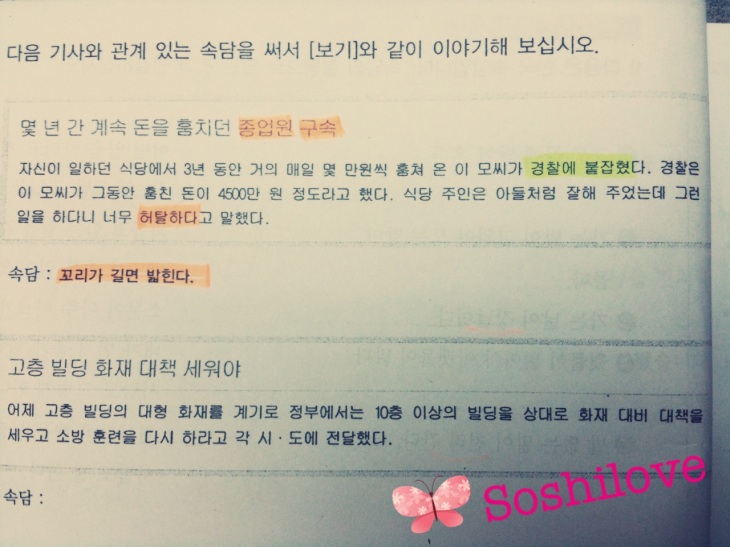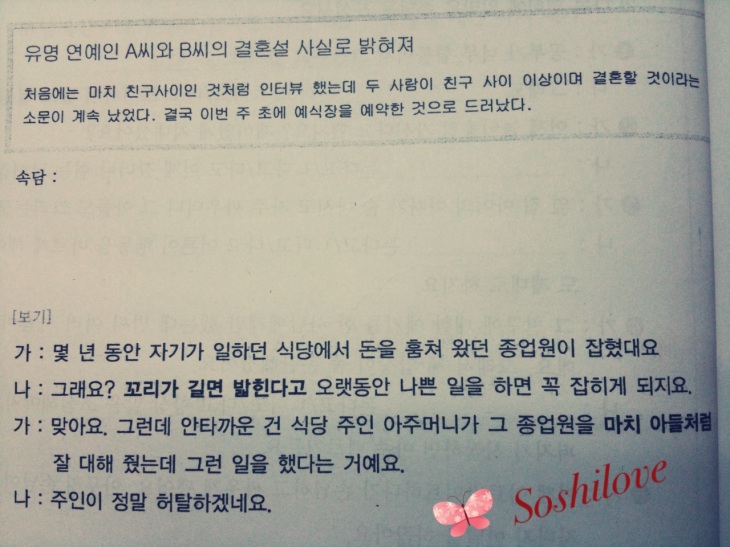
Today, I just write a short review of Yonsei Korean 4 textbook ^^
While learning Unit 6 in the Yonsei Korean 4 textbook, I was taken aback by this exercise about the proverbs (속담). The exercise is to write the proverbs related to the following articles. At first, I thought this exercise was very challenging and interesting, but then I soon got tired because of thinking too much. I understood the article, but I couldn’t recall any suitable proverbs that I have learned so far (most of them are from the previous Topik paper). In the unit 6, there are not any lists of proverbs available, so I wonder how I can guess the proverbs. Furthermore, there is NO ANSWER KEY for the textbook. It is really hard for self-study :(((
I had to ask my Korean friend for help, and he was willing to help me. He just skimmed the article and knew the proverbs at once.
Here are the answers:
1. Proverb for the article 1:
꼬리가 길면 밟힌다
Repeated misbehaviors will be caught sooner or later.
Đi đêm lắm có ngày gặp ma
2.Proverb for the article 2:
아니 땐 굴뚝에 연기 나랴
There is no smoke without fire.
Không có lửa sao có khói
3.Proverb for the article 3:
소 잃고 외양간 고친다
You act too late (only fix the fence after the cow has escaped)
Mất bò mới lo làm chuồng




I was wondering if I should work with the Yonsei series but I already bought the Ewha ones and I’ll start them this summer when my thesis will be over XD I’ll see if the Ewha series are good, if not I’ll switch to Yonsei I think. I’m a bit “scared” because they say that Ewha is a level under Yonsei and that Yonsei is really hard for self-study… We’ll see ^^
LikeLike
Thanks for your comment. ^^ As mentioned in your blog, I use SNU textbooks, so when I study Yonsei Korean books, it seems very hard to me, but don’t worry so much. You can benefit a lot from the Yonsei Korean. Compared to Ewha 4, Yonsei 4 definitely has more grammar points. However, Ewha textbooks have the answer key while Yonsei textbooks don’t provide answer keys. (But Yonsei workbooks provide answer keys, so you can self-study)
Therefore, after you study Ewha 4, it will become easier to study Yonsei 4
LikeLike
That’s a good idea ^^ Maybe I can use Ewha 4 as a “transition” to the Yonsei 4 🙂 But which one would you advise me ? 4-1 or 4-2 ? I wish I could see the grammar points of 4-1 because if it’s too similar to Ewha 4 it would be a waste to buy it xD
LikeLike
@renniski:
Yonsei Korean 4 (including 4.1 and 4.2) has about 80 grammar points while ewha korean 4 only has 26 grammar points. Therefore, some grammar points from ewha 4 are repeated in both Yonsei 4.1 and 4.2 . Of course Yonsei 4.1 and 4.2 , each of which has new grammar points too.
In my opinion, I both prefer Yonsei 4.1 and 4.2 . However, if you want the safety, you can buy Yonsei 4.2 because it is more difficult than Yonsei 4.1
LikeLike
I think I’ll do that then ^^ Thank you 🙂 ! I also bought “Korean grammar in use” (beginner and intermediate) two weeks ago so I hope some of the Yonsei 4-1 and missing Ewha grammar points will be covered in it ! 😛
LikeLike
The grammar structures are always limited, so every book seems to have some grammar points overlapped. However, the vocabulary is infinite, so you can benefit from every book ^^ The more you read, the more you learn the vocabulary from different contexts and have the chances to practice the same grammar points in different ways. ^^
LikeLike
Oh! Thanks I have been wanting to buy some new books just didn’t know which to choose from so many 😀 I was stuck between the Ewha and Yonsei!!!! Didn’t make the choice easier but at least I know what has what and guess which is better for my weaknesses 😀
LikeLike
Thanks for your comment. In my opinion, Yonsei Korean books have more grammar points while Ewha books have more vocabularies. Ewha books seem to be more friendly for self-studying ^^
LikeLike
Thank you for the review. Wow, it just look very very hard…
LikeLike
Yes, I think Yonsei KOrean 4 is considered as the most difficult series, but we can learn a lot from this book.
LikeLike
hello! i’m thinking of getting yonsei’s textbook. which level for Yonsei textbook would you recommend? Thanks in advance! 🙂
LikeLike
Thanks for your comments. What are your current level of Korean? I think Yonsei 4 is suitable for upper intermediate level ^^
LikeLike
sorry i forgot to add that im at TOPIK 2 🙂
LikeLike
@1fiftysix: If you have topik 2, you can study Yonsei 2 or move on with Yonsei 3 series ^^. Yonsei textbook has 6 levels in total. After getting Topik 2, I study Yonsei 3 and I think that book is great with many vocabularies and grammars ^^.
LikeLike
guess i’ll do as you suggested~ thanks! 🙂
LikeLike
I have to agree, the Yonsei series is probably not ideal for self-study. I bought Yonsei 3 last year but it’s so difficult without having someone there to explain!
LikeLiked by 1 person
Thank you for your comment. The Yonsei Korean Textbooks seem too difficult for self-studying, but I really like challenges, so I will try my best to finish this series.
P/S: The Yonsei Korean Workbooks provide many exercises and supplementary vocabularies/idioms/proverbs. They even have the answer keys which are good for self-studying. I really like the Workbooks ^^
LikeLike
I’ll have to knuckle down and give them another go!
LikeLike
chị có thể tư vấn cho em giữa giáo trình seoul, so gang với yonsei giáo trình nào dễ học với tốt hơn không?
LikeLike
Sử dụng giáo trình cũng tùy vào mục đích mình học nữa. Chẳng hạn như học vì sở thích, học để đi làm, học để thi Topik. ^^ Em đang học ở trung tâm hay sao?
Thường thì đa số các trung tâm dạy tiếng Hàn đều học quyển giáo trình Seoul (bộ 4 quyển, mỗi quyển cỡ 30 đến 30 bài). Quyển Seoul thì nổi tiếng lâu đời, phần ngữ pháp và cụm từ cho ví dụ rất rõ ràng, dễ hiểu, nhưng mà giải thích không có kỹ, tự học sẽ hơi khó. Sách có nhiều từ mới, cung cấp cả từ Hán Hàn cho dễ nhớ nhưng mà không có phần bài đọc hay văn hóa Hàn Quốc nhiều.
Quyển Sogang bộ mới thì hình ảnh đặc sắc khiến học thấy hứng thú hơn. Sách tập trung vào giao tiếp nên có nhiều hoạt động, chủ đề để nói. Đặc biệt có các bài đọc để học thêm từ mới và hiểu thêm về văn hóa. Tuy nhiên, phần nghe và phần ngữ quá dễ .
Quyển Yonsei bộ mới thì dày cộm, Tuy có nhiều hình ảnh minh họa hơn nhưng hơi ngán. Từ vựng được trình bày phân chia theo từng nhóm nên dễ thuộc. Phần ngữ pháp thì đầy đủ và giải thích khá kĩ kèm ví dụ. Yonsei còn có các bài đọc về văn hóa cực hay. Nhưng mà dày quá nên học hơi mệt, bài tập trong sách giáo khoa cũng ko có đáp án nên tự học khó lắm.
LikeLiked by 1 person
em định thi topik ạ
LikeLike